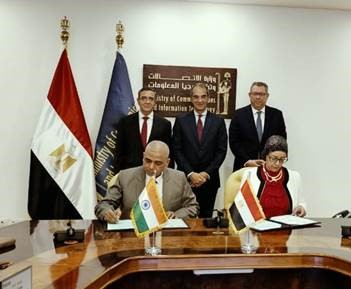In a move aimed at advancing digital connectivity and accessibility in rural India, the Universal Service Obligation Fund (USOF) under the Department of Telecommunications (DoT) has entered into a tripartite Memorandum of Understanding (MoU) with Prasar Bharati, under the Ministry of Information & Broadcasting, and the Open Network for Digital Commerce (ONDC), an initiative of the Department for Promotion of Industry and Internal Trade under the Ministry of Commerce & Industry.
The primary objective of this MoU is to integrate broadband services with over-the-top (OTT) platforms and e-commerce solutions, leveraging the BharatNet infrastructure facilitated by USOF. The collaboration, rooted in the vision of the national vision to foster digital innovation, brings together connectivity, content, and commerce to empower rural India.
The signing ceremony was attended by key stakeholders including Dr Neeraj Mittal, Secretary (Telecom); Shri Niraj Verma, Administrator, USOF; Shri T Koshy, MD & CEO, ONDC; Shri A K Jha, ADG, Platforms, Prasar Bharati; and Shri Sunil Kumar Verma, Joint Secretary, DoT, marks a significant milestone in advancing digital inclusivity.
USOF’s pivotal role in facilitating high-speed broadband and mobile connectivity across Gram Panchayats (GPs) and villages sets the stage for the implementation of bundled services. Prasar Bharati’s vast content repository, encompassing linear channels, live TV, and on-demand content, will be made available to end consumers through its OTT platform, while USOF ensures the delivery of efficient broadband services to rural and remote areas.
ONDC’s expertise in digital infrastructure will play a crucial role in enabling e-commerce solutions, thereby expanding access to essential services such as education, healthcare, training, credit, insurance, and agriculture. This holistic approach aims to leverage technology for socio-economic development, ensuring that all segments of society can participate in the digital transformation.
The vision of the Digital India Programme is to transform India into a digitally empowered society and knowledge economy. The Digital India programme is centred on three key vision areas: Digital Infrastructure as a core utility to Every Citizen, Governance & Services on Demand and Digital Empowerment of Citizens
India is committed to advancing technology, science, and digital learning by enhancing the skills and methodologies of its educators. Recognising the pivotal role of teachers in shaping the future generation, India has undertaken various initiatives to empower educators with the necessary tools and knowledge to effectively integrate technology and innovative teaching methods into the classroom.

OpenGov Asia reported that the CSIR-National Metallurgical Laboratory (CSIR-NML) has collaborated with the Knowledge and Awareness Mapping Platform (KAMP) for an online teacher training programme focused on revolutionising science education through technology.
With over 150 educators from various schools across India participating, the programme, themed ‘Fostering Experiential Learning in Science Education, Beyond the Textbook’, emphasised innovative teaching methodologies and practical demonstrations to enhance educators’ understanding and implementation of scientific concepts.
Beyond domestic initiatives, India is also committed to sharing its expertise and collaborating internationally to foster digital inclusivity. In this vein, a Memorandum of Understanding has been signed between the National Institute of Electronics and Information Technology (NIELIT) of India and the Information Technology Institute (ITI) of Egypt.
The agreement, formalised in Cairo, Egypt, aims to enhance workforce skills, promote employment opportunities, address skills gaps, and foster international cooperation in the Information, Electronics, and Communication Technology (IECT) domain.
The collaboration covers curriculum development, expert exchanges, mutual certification recognition, virtual lab sharing, and offering postgraduate diplomas to ITI Egypt interns, with Egyptian students also able to enrol in B.Tech and M.Tech programmes by NIELIT, fostering bilateral knowledge exchange in the digital domain.
Through such strategic partnerships and collaborative initiatives, India is poised to accelerate its digital transformation journey while extending support and expertise to partner nations, contributing to a more inclusive and digitally empowered global community.




















